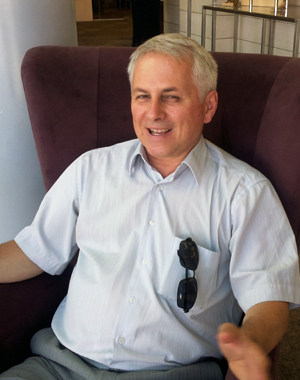"Southeast Europe and European integration: political, socio-economic and cultural aspects" - this is the motto at the 11th International Congress on East European Studies, held in Sofia from 31 August to 4 September. More about the history of the Congress we learn from prof. Alexander Kostov from the Institute for Balkan Studies with the Bulgarian Academy of Sciences:
 "The main organizer of the congress is the International Association for the Study of Southeast Europe. It was established in 1963 during the Cold War era, when, despite the complicated political situation, favorable conditions for scientific cooperation appeared. Then many research centers in the region started work. The Association studies history, literature, art, and societies from antiquity to the present day. The first congress of Balkan studies (as it is known in Bulgaria) was held in Sofia in 1966. Its following edition in the Bulgarian capital was in 1989. Traditionally it is organized on the Bulgarian side by the Institute for Balkan Studies with a Centre for Thracian Studies at BAS."
"The main organizer of the congress is the International Association for the Study of Southeast Europe. It was established in 1963 during the Cold War era, when, despite the complicated political situation, favorable conditions for scientific cooperation appeared. Then many research centers in the region started work. The Association studies history, literature, art, and societies from antiquity to the present day. The first congress of Balkan studies (as it is known in Bulgaria) was held in Sofia in 1966. Its following edition in the Bulgarian capital was in 1989. Traditionally it is organized on the Bulgarian side by the Institute for Balkan Studies with a Centre for Thracian Studies at BAS."
The 11th congress is attended by more than 250 specialists in various fields of studies from 26 countries. The worldwide academic elite in Southeast European Studies is now in Sofia. Of course, all countries from the region are represented as well as major research centers in Russia, USA, China, and Japan.
"This edition of the congress is dedicated to a very hot topic - The Balkans and European Integration, emphasizing not only the process of actual accession of the countries of the region to the European Union, but also integration understood in broader terms”, prof. Alexander Kostov explains. “We look into the participation of the Balkan countries into the European family in every way - cultural, political, economic, during the periods preceding the actual accession. There are 18 topics directly or indirectly associated with the motto of the forum. They relate to literature, linguistics, history, arts and media. Our session on economic issues drew huge interest - it was related to Russian and Chinese investment in Southeast Europe. There is a separate topic about NATO in the Balkans. "
There are many curious and little-known facts that scientists present at the forum. Prof. Alexander Novik from Russia told Radio Bulgaria more about one of his research:
"I am working on an article related to the medical practices of the Albanians who live in Ukraine. Their history is very interesting. At the end of the 16th century or the early 17th century, a large group of Albanians left their homes and settled in the region of Varna (eastern Bulgaria). They lived there for three centuries and during the Russo-Turkish War of 1877-1878, together with the Bulgarians and Gagauz people, they were forced to leave their villages. The Russian government allowed them to settle in the town of Odessa, where they live in four villages to this day, keeping their language and traditions, which are strongly influenced of course by Bulgarian language and traditions."
Examples of coexistence in the Balkans are numerous and no doubt they are particularly relevant in the modern severe refugee crisis. This topic has also found a place in the delivered talks.
English Rossitsa Petcova
An investigation carried out after a signal was received about an unnatural dark brown colour of the water near the beach in the Varna district of Asparuhovo , as well as in the entire area of the port of Varna on the Black Sea coast, has revealed that..
The Samokov village of Dragushinovo is the only one in Bulgaria where Todorovden is celebrated by preparing the so-called Rachnik. The local church is named after St Theodore Tiron, the Christian saint and warrior who is venerated on Todorovden...
The majority of Bulgarians (63%) celebrate International Women's Day on 8 March . The holiday is more respected by women, with almost 8 out of 10 responding positively. Almost two-thirds of women (65%) say they feel more special on this day. This is the..
Over the next few months, there will be three events dedicated to the famous Busintsi ceramics in Sofia, Burgas and Ihtiman. There will be ceramics and..
The monument to the Bulgarian alphabet, created by Bulgarian artist Bronislav Likomanov , has arrived in Los Angeles, where it will be installed. The..
An actress born in Sofia in the family of Liliana Kisyova and Konstantin Hadzsikostov, extremely popular Bulgarian artists of the second half of the last..

+359 2 9336 661
